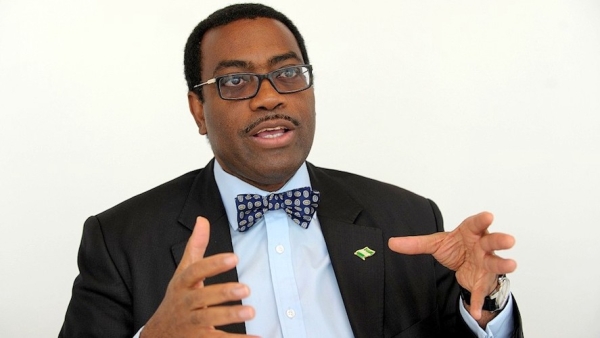Calls for bold reforms in infrastructure, industrialisation, governance
President of African Development Bank (AfDB), Dr. Akinwumi Adesina, has issued a sobering warning on Nigeria’s economic trajectory, cautioning the country risks long-term stagnation unless it confronts its chronic infrastructure and power deficits head-on.
In his keynote address delivered at the 20th Anniversary Dinner of Chapel Hill Denham in Lagos, Adesina painted the picture of a country full of potential but hampered by policy inaction and weak execution.
He urged Nigerian policymakers and investors to move boldly in reforming key sectors if the country was to reclaim its economic future.
The AfDB president stated, “Without reliable power Nigeria’s economy will be locked in a never-ending slow growth trajectory, without transformation. You cannot industrialise, you cannot compete, and you certainly cannot create jobs at scale if you don’t have electricity.
“Access to power is not just about lights, it’s about productivity, competitiveness, and prosperity.”
He stressed that electricity access will be pivotal in unlocking Nigeria’s digital economy, attracting data centres, enabling artificial intelligence applications, and lowering costs for small and large businesses.
Adesina said, “The digital economy cannot thrive on diesel generators. We must create a 21st-century grid, powered by clean, reliable, and scalable energy solutions. And for that, the private sector must be at the heart of the energy transition.”
Adesina called for structural reforms to encourage greater private investment in Nigeria’s energy sector. He identified areas needing improvement to include cost-reflective tariffs, enforceable power purchase agreements, and access to blended finance from multilateral institutions, like AfDB and World Bank.
He stated, “The market must work, investors need clarity, certainty, and contracts that are bankable. With the right regulatory environment, Nigeria can become a hub for green energy, not just for itself, but for West Africa.”
Adesina revealed that AfDB, in partnership with World Bank, had launched “Mission 300”, an ambitious initiative to connect 300 million people in Africa to electricity by 2030.
“Nigeria should position itself to be a major beneficiary of this, it is time to accelerate electrification with urgency and scale,” he said.
Beyond the power sector, Adesina warned that Nigeria’s broader infrastructure shortfall was impeding industrial growth and regional competitiveness.
He called for renewed efforts to mobilise long-term capital, especially pension and sovereign wealth funds, into infrastructure as an asset class.
According to him, “Nigeria must build world-class infrastructure, from highways to railways, speed trains, airports, seaports, telecoms, and broadband connectivity.
“If we do not fix our logistics bottlenecks, we will continue to lose in the African Continental Free Trade Area.”
He added, “Let us be clear, no investor will stay in a market where they cannot move goods efficiently or communicate seamlessly. Infrastructure is not a luxury. It is the foundation of every competitive economy.”
Adesina urged Nigeria to adopt modern financing models, such as “originate-to-distribute”, and de-risk infrastructure projects to make them more bankable. He also called for deeper local capital markets and the expansion of local currency financing for large-scale projects.
Turning to manufacturing, the AfDB president lamented Nigeria’s declining industrial capacity, stating that the country’s manufacturing export value per capita is just $160, a far cry from Vietnam’s $3,600 or Malaysia’s $7,100.
He said, “In the 1980s, Nigeria showed signs of becoming a manufacturing giant. We assembled cars, produced textiles, and processed agricultural goods. Today, much of that has vanished. We lost ground, and others took our place.”
Adesina said Nigeria missed the opportunity to become an auto-manufacturing powerhouse, a role South Africa now played on the continent.
He stressed that Nigeria must urgently industrialise by linking its raw materials to finished products, developing industrial zones, and improving the ease of doing business.
“Every barrel of oil, every ton of cassava or cocoa, should not just be exported raw,” he said. “We must add value at home. That is how you create jobs, grow GDP, and build economic resilience.”
In addition, Adesina stressed the need for a knowledge-driven economy built on science, technology, and innovation.
He said, “Nigeria must invest in its universities and research institutions, and reverse the brain drain by creating an environment where talent can thrive at home.”
He also pointed to agriculture as a transformational opportunity. Through initiatives like the Special Agro-Industrial Processing Zones (SAPZ), a $1.3 billion programmeco-financed by the AfDB, Islamic Development Bank, and the International Fund for Agricultural Development, Adesina said Nigeria could become a major player in global food markets.
“These zones will turn rural areas into economic zones of prosperity, they will create millions of jobs for youth and women, and reduce rural-to-urban migration,” he added.


